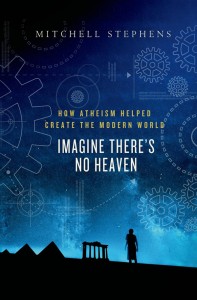Book Review: Imagine There’s No Heaven: How Atheism Helped Create the Modern World

In Imagine There’s No Heaven: How Atheism Helped Create The Modern World, author Mitchell Stephens delivers a readable, vibrant history of disbelief and atheistic thought, arguing persuasively that intellectual challenges to religious belief were a major catalyst to increasing knowledge in the modern world.
Stephens’ book is first and foremost a history of disbelief, from the Greeks and Romans though the low points of the Dark Ages where it was institutionally repressed, then into the Renaissance where it fought to maintain a foothold, and finally into the Enlightenment where atheism (and its more prevalent, slightly religious cousin, deism) finally became a valid viewpoint, at least among intellectual circles. He then follows disbelief through the nineteenth and twentieth centuries, and into our own, before suggesting where atheism might be heading based on his historical analysis.
The history of disbelief is much more prevalent and rich than traditional history has portrayed, as atheism’s role has usually been downplayed or outright denied by conventional histories. Stephens brings out the role of many often overlooked personages, such as Denis Diderot, Jean Meslier and Charles Bradlaugh—the first open atheist elected to Parliament in 1880 but who was denied his seat until he was re-elected several times.
While primarily a history, as the subtitle of his book suggests, Stephens’ also argues that disbelief and the progress of knowledge have gone hand in hand throughout history. Whenever knowledge took great leaps forward, religious doubters were right there, stoking the intellectual fires. Stephens argument is not that it was only doubters that pushed knowledge, but rather that the questions raised by doubt were what drove people to seek answers, and those answers often drove further doubt. Mitchell begins by categorizing and describing five basic types of disbelief. The first is a basic skepticism – a simple questioning by someone of why would one believe that there is a god. The second Stephens calls the “anacreontic” named after a Greek poet who urged people to “live joyously” and can be roughly said to be a practical minded, “I’m living my life now, and I’m concentrating on this life” philosophy. These two types are probably present throughout history, but are rarely expanded on beyond when society frowns upon them, which society has throughout most of history/
The third type of disbelief is the more important to Stephens’ argument—disbelief brought on by knowledge of a better explanation. The fact that the earth revolves around the sun denies many of the stories of the Bible, as does human’s evolution over time. Knowledge brings about disbelief, and that brings about the thirst for more knowledge.
The fourth and fifth categories for disbelief are a little more nuanced. The fourth is the realization that religion is often a tool of repression and thought control—therefore, disbelief in religion translates into political opposition to the established order. Within this understanding, Stephens explores the troubling areas of state atheism propounded by Russia and China in the 20th century. Without shying away from painful historical truth, his insights are lucid and well presented, as uncomfortable as they may sometimes be to more modern non-believers.
The fifth category is a variation of the anacreontic second—a realization of the “open sea” of ideas that can be considered when belief in one certain, set religious system is set aside. It extols the beauty of possibilities—and the challenge in shaping our own future.
No matter the reader of this book, whether atheist or devout, the thoughtful analysis of the various kinds of disbelief and the history of atheistic thought is well laid out, well researched, and told exceedingly well. He is a graceful writer, and other than one or two chapters that get a little too heavy on the philosophy, the book is a smooth but enlightening journey.
As to his argument that disbelief is what made the modern world possible, I found it convincing, although I expect those of a more religious bent might not find it as compelling. Nevertheless, Stephens puts forward an argument that must be addressed by any who wish to step beyond their own rigid belief system. And isn’t that where knowledge begins?
